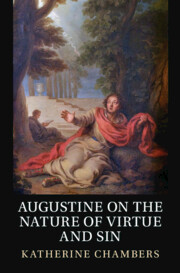Book contents
- Augustine on the Nature of Virtue and Sin
- Augustine on the Nature of Virtue and Sin
- Copyright page
- Contents
- Acknowledgements
- A Note on Translations and Abbreviations
- 1 Introducing the Issues
- 2 Political Virtues?
- 3 Political Vices?
- 4 Augustine’s Definitions of Virtue
- 5 Augustine’s Place within the Eudaimonist Tradition
- 6 The Life in Accordance with Nature
- 7 Self-Love and Neighbour-Love
- 8 The Nature of Sin
- 9 Weakness, Ignorance, and Pride
- Bibliography
- Index
2 - Political Virtues?
Published online by Cambridge University Press: 10 January 2024
- Augustine on the Nature of Virtue and Sin
- Augustine on the Nature of Virtue and Sin
- Copyright page
- Contents
- Acknowledgements
- A Note on Translations and Abbreviations
- 1 Introducing the Issues
- 2 Political Virtues?
- 3 Political Vices?
- 4 Augustine’s Definitions of Virtue
- 5 Augustine’s Place within the Eudaimonist Tradition
- 6 The Life in Accordance with Nature
- 7 Self-Love and Neighbour-Love
- 8 The Nature of Sin
- 9 Weakness, Ignorance, and Pride
- Bibliography
- Index
Summary
This chapter asks whether Augustine agreed with the Stoics and Platonists that there were no necessary outward differences between the lives of the vicious and the virtuous. Answering this question requires investigating whether he thought in terms of political virtues; this chapter finds that he did not. It finds that, for Augustine, justice – whether human justice or true justice – was not a political virtue, because it was primarily a description of our loves: the humanly just and the truly just differed at the level of their loves, but not at the level of their actions.
- Type
- Chapter
- Information
- Augustine on the Nature of Virtue and Sin , pp. 45 - 81Publisher: Cambridge University PressPrint publication year: 2023

